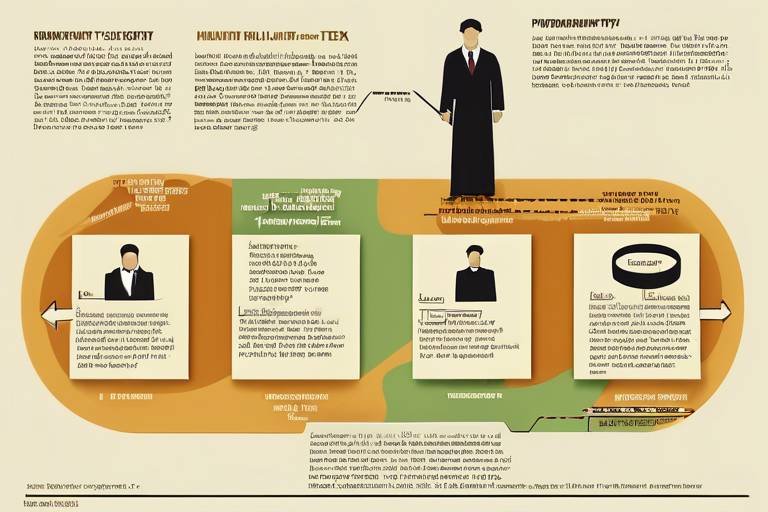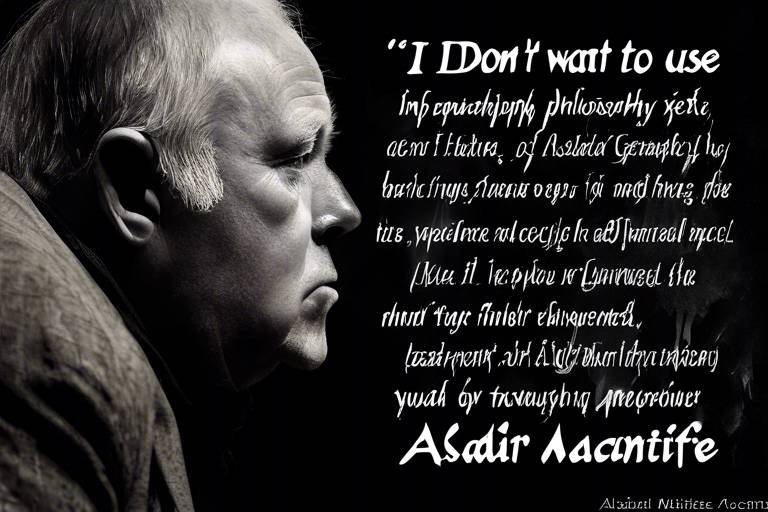The Philosophy of Sun Tzu in The Art of War
Sun Tzu's The Art of War is not just a military manual; it’s a profound exploration of strategy, leadership, and the psychology of conflict that transcends time and culture. Written over two millennia ago, this ancient text continues to resonate in today’s world, offering invaluable insights for leaders, business strategists, and anyone facing challenges in their personal or professional lives. The essence of Sun Tzu's philosophy lies in understanding that warfare is not merely about brute force; it's about intellect, strategy, and adaptability.
At its core, Sun Tzu emphasizes the importance of preparation and understanding one's environment. He famously stated, "If you know the enemy and know yourself, you need not fear the result of a hundred battles." This principle underscores the idea that knowledge is power. It’s not just about knowing your own strengths and weaknesses, but also about comprehending those of your adversaries. This dual awareness allows one to maneuver through conflicts with a strategic mindset, making informed decisions that can lead to victory without unnecessary confrontation.
Another critical aspect of Sun Tzu's philosophy is the notion of deception. In warfare, misleading your enemy can create significant advantages. Sun Tzu advises, "All warfare is based on deception." This principle can be likened to a game of chess, where the ability to outthink your opponent is often more decisive than the pieces on the board. By creating illusions and misdirections, a leader can manipulate the battlefield to their advantage. This concept of deception extends beyond the battlefield; it can be applied in business negotiations, where presenting a facade can lead to strategic gains.
Furthermore, Sun Tzu's teachings delve into the qualities of effective leadership. He posits that a great leader must possess traits such as wisdom, courage, and benevolence. These qualities are essential for maintaining the loyalty and morale of troops, or in a modern context, employees or team members. A leader who embodies these characteristics can inspire others to follow them into battle, whether it be in a literal war or a competitive business environment. The ability to connect with people on a personal level and motivate them is a skill that transcends the ages, making Sun Tzu's insights relevant even today.
In conclusion, the philosophy of Sun Tzu in The Art of War is a treasure trove of wisdom that extends far beyond military applications. It teaches us about the importance of strategy, the power of understanding oneself and others, and the timeless qualities of effective leadership. Whether we are navigating personal conflicts, leading teams, or competing in the business world, the principles laid out by Sun Tzu remain a guiding light, illuminating the path to success through foresight and intelligence.
- What is the main message of The Art of War? The main message is that strategy, preparation, and understanding both oneself and the enemy are crucial for success in any conflict.
- How can Sun Tzu's principles apply to modern business? His principles can be applied to competition, negotiation, and leadership, emphasizing the importance of strategy and adaptability.
- Is The Art of War relevant today? Absolutely! Its insights into strategy, leadership, and conflict resolution are timeless and applicable in various fields.

The Art of War,
This article explores the timeless principles of strategy, leadership, and conflict resolution outlined by Sun Tzu in his classic work, The Art of War, and their relevance today.
Understanding the historical background in which Sun Tzu wrote The Art of War provides insights into his philosophies and the military strategies of ancient China that influenced his teachings. Sun Tzu, believed to have lived during the Eastern Zhou period, crafted his insights during a time of intense warfare and political fragmentation. This chaotic environment shaped his thoughts on strategy, as he observed the failures and successes of various warlords. His experiences led him to emphasize the significance of strategic foresight, adaptability, and the psychological aspects of warfare. By studying the context of his life, we can appreciate why his principles have endured for centuries, transcending the battlefield to influence various fields, including business and personal development.
Sun Tzu emphasizes the importance of strategic planning and adaptability in warfare. This section delves into the core principles that define effective strategy according to his teachings. One of the most profound aspects of his philosophy is the idea that "all warfare is based on deception." This notion not only applies to military conflict but can also be seen in everyday scenarios where strategy plays a crucial role. For instance, consider how a chess player anticipates an opponent's moves while simultaneously crafting a plan that misleads them. In this way, Sun Tzu's teachings encourage us to think several steps ahead, to be flexible in our approach, and to always remain vigilant against potential threats.
Deception is a key element in Sun Tzu's philosophy. This subheading examines how misleading the enemy can lead to strategic advantages and the psychological aspects of warfare. Sun Tzu famously stated, "If your opponent is of choleric temper, seek to irritate him." This highlights the importance of psychological manipulation in warfare. By understanding the emotions and motivations of your adversary, you can craft strategies that exploit their weaknesses. Deception isn't merely about trickery; it's about creating an environment where your opponent makes mistakes based on false assumptions. This principle can be applied in various areas of life, from negotiations to competitive sports, where understanding the mindset of your opponent can lead to victory.
Historical examples illustrate how successful military leaders have employed deception, inspired by Sun Tzu's teachings, to outmaneuver their opponents and secure victory in battles. One notable instance is the Trojan Horse, a cunning stratagem that allowed the Greeks to infiltrate Troy. By presenting a gift that concealed their true intentions, the Greeks were able to turn the tide of the war. Another example is the use of feigned retreats, where an army pretends to flee, luring the enemy into a vulnerable position. These tactics underscore the effectiveness of deception in achieving strategic goals, demonstrating that the mind can be as powerful a weapon as any sword or spear.
This section discusses how the principles of deception can be applied in contemporary contexts, such as business and negotiations, reflecting Sun Tzu's timeless wisdom. In the corporate world, companies often engage in strategic positioning, creating an image that may not fully reflect their true capabilities or intentions. For example, a business might downplay its strengths to keep competitors complacent, only to reveal its full potential at a critical moment. Similarly, in negotiations, understanding when to reveal information and when to withhold it can lead to more favorable outcomes. Thus, the art of deception, when wielded ethically, can be a powerful tool in various modern arenas.
Sun Tzu outlines essential leadership qualities necessary for success in battle. This subheading explores the traits that make an effective leader according to his philosophy. He emphasizes the importance of wisdom, courage, and benevolence. A wise leader understands the complexities of both their own forces and those of the enemy, making informed decisions that can alter the course of conflict. Courage is essential, not just in the face of danger, but in making tough decisions that may not always be popular. Lastly, benevolence fosters loyalty among troops, creating a cohesive unit that is willing to follow their leader into battle. These qualities are not only applicable in warfare but also resonate in everyday leadership scenarios, from managing a team to guiding a community.
The Art of War offers insights into resolving conflicts peacefully. This section highlights Sun Tzu's views on negotiation and the importance of understanding one's adversaries to achieve harmony. Sun Tzu believed that the best victory is one that is achieved without fighting. This philosophy advocates for a deep understanding of the conflict at hand and the motivations of all parties involved. By recognizing the underlying issues and addressing them directly, it is possible to find solutions that satisfy everyone and avoid unnecessary confrontations.
A deep understanding of the enemy is crucial for conflict resolution. This subheading discusses how Sun Tzu advocates for knowing both oneself and the opponent to achieve favorable outcomes. He famously stated, "Know your enemy and know yourself and you can fight a hundred battles without disaster." This principle emphasizes the importance of self-awareness and empathy in conflict situations. By understanding your own strengths and weaknesses, as well as those of your opponent, you can navigate disputes more effectively and find common ground.
This section examines the negotiation tactics inspired by Sun Tzu's teachings, emphasizing the balance between assertiveness and diplomacy in resolving disputes effectively. Negotiation, much like warfare, requires strategy. Sun Tzu encourages leaders to approach negotiations with a clear understanding of their goals while remaining flexible in their methods. This could mean making concessions in one area to gain advantages in another, or knowing when to stand firm on certain issues. The key is to maintain a balance that fosters cooperation rather than hostility, ultimately leading to a win-win situation.
- What is the main theme of The Art of War?
The main theme revolves around strategy, deception, and understanding both oneself and one's opponent in order to achieve success in conflict. - How can Sun Tzu's principles be applied in modern business?
Many of Sun Tzu's principles, such as strategic planning and the importance of understanding competitors, can be effectively applied in business negotiations and competitive strategies. - Is The Art of War relevant today?
Absolutely! The insights from The Art of War are applicable not only in military contexts but also in areas like leadership, business, and personal development.

and their relevance today.
This article explores the timeless principles of strategy, leadership, and conflict resolution outlined by Sun Tzu in his classic work, The Art of War, and their relevance today.
Understanding the historical background in which Sun Tzu wrote The Art of War provides insights into his philosophies and the military strategies of ancient China that influenced his teachings.
Sun Tzu emphasizes the importance of strategic planning and adaptability in warfare. This section delves into the core principles that define effective strategy according to his teachings.
Deception is a key element in Sun Tzu's philosophy. This subheading examines how misleading the enemy can lead to strategic advantages and the psychological aspects of warfare.
Historical examples illustrate how successful military leaders have employed deception, inspired by Sun Tzu's teachings, to outmaneuver their opponents and secure victory in battles.
This section discusses how the principles of deception can be applied in contemporary contexts, such as business and negotiations, reflecting Sun Tzu's timeless wisdom.
Sun Tzu outlines essential leadership qualities necessary for success in battle. This subheading explores the traits that make an effective leader according to his philosophy.
The Art of War offers insights into resolving conflicts peacefully. This section highlights Sun Tzu's views on negotiation and the importance of understanding one's adversaries to achieve harmony.
A deep understanding of the enemy is crucial for conflict resolution. This subheading discusses how Sun Tzu advocates for knowing both oneself and the opponent to achieve favorable outcomes.
This section examines the negotiation tactics inspired by Sun Tzu's teachings, emphasizing the balance between assertiveness and diplomacy in resolving disputes effectively.
Sun Tzu's principles from The Art of War are not just relics of ancient military strategy; they resonate profoundly in our modern world. Whether in business, sports, or personal relationships, the core tenets of his philosophy offer invaluable insights. For instance, the concept of strategic planning can be seen in how businesses forecast market trends and prepare for competition. Just as a general would analyze the terrain before battle, modern leaders assess their market landscape to ensure they are positioned for success.
Moreover, the emphasis on deception—not in a morally dubious sense, but rather as a means of gaining a competitive edge—can be observed in marketing strategies where companies often create narratives that resonate with consumers, sometimes leading them to perceive a product or service as superior. This psychological maneuvering is akin to the tactical feints described by Sun Tzu, where misleading the opponent can lead to victory.
In the realm of leadership, the qualities Sun Tzu champions—such as wisdom, courage, and benevolence—are just as essential today. Effective leaders inspire trust and loyalty among their teams, much like the generals of ancient times who led their soldiers into battle with conviction and clarity. Leadership today requires a blend of emotional intelligence and strategic foresight, echoing Sun Tzu's teachings.
Additionally, the principles of conflict resolution he outlines are incredibly relevant in today's society, where interpersonal conflicts and negotiations are commonplace. Understanding your opponent, as Sun Tzu suggests, is crucial not only for military success but also for achieving favorable outcomes in business deals or personal disputes. By employing negotiation strategies that balance assertiveness with empathy, individuals can navigate conflicts more effectively.
In summary, the wisdom of Sun Tzu transcends time and remains pertinent in various aspects of modern life. His teachings on strategy, leadership, and conflict resolution continue to guide individuals and organizations in achieving their goals, reminding us that the essence of warfare is not just about battle, but about the art of understanding and outmaneuvering those around us.
- What is the main message of The Art of War?
The main message of The Art of War is that effective strategy and understanding one's opponent are crucial for success in conflict, whether in warfare or in everyday life. - How can Sun Tzu's teachings be applied in business?
Sun Tzu's teachings can be applied in business through strategic planning, competitive analysis, and employing negotiation tactics that balance assertiveness with diplomacy. - Are the principles in The Art of War still relevant today?
Yes, the principles in The Art of War are still highly relevant today, influencing various fields such as business, sports, and personal relationships.

The Historical Context of Sun Tzu
To truly grasp the essence of Sun Tzu's philosophies in The Art of War, one must first delve into the rich historical tapestry of ancient China. Written during the tumultuous period of the Warring States (475-221 BC), this era was characterized by relentless conflict among various states vying for dominance. The chaos of these times shaped Sun Tzu's thoughts, providing him with unique insights into the nature of warfare, strategy, and leadership.
Sun Tzu, believed to be a military general and strategist, lived in a time when the concept of warfare was not just about brute strength but also about cunning and strategy. The constant battles forced leaders to innovate and adapt rapidly, leading to the emergence of strategies that emphasized intelligence and deception over sheer force. This shift in mindset is crucial to understanding the principles laid out in his work.
The socio-political environment was rife with instability, and the fragmented nature of the states allowed for a diverse range of military practices and philosophies to flourish. Sun Tzu's teachings emerged as a response to this chaos, advocating for a methodical approach to conflict that prioritized planning and adaptability. His famous assertion, "All warfare is based on deception," reflects a profound understanding of human psychology and the dynamics of power during his time.
Moreover, Sun Tzu's context was not just limited to military affairs. The philosophical undercurrents of Taoism and Confucianism also played a significant role in shaping his thoughts. The principles of harmony, balance, and the importance of moral authority in leadership resonate throughout The Art of War. Leaders were expected to embody virtues that inspired loyalty and respect, which is why Sun Tzu emphasized the qualities of a leader as essential for success in battle.
In summary, understanding the historical context of Sun Tzu allows us to appreciate the depth of his strategies. His teachings are not merely about winning battles; they are about understanding the human condition and the complexities of conflict. The relevance of his work continues to echo through the ages, reminding us that the principles of strategy and leadership are timeless.

The Art of War
This article explores the timeless principles of strategy, leadership, and conflict resolution outlined by Sun Tzu in his classic work, The Art of War, and their relevance today.
Understanding the historical background in which Sun Tzu wrote The Art of War provides insights into his philosophies and the military strategies of ancient China that influenced his teachings. Sun Tzu lived during a period of intense warfare known as the Warring States period (475–221 BC), a time characterized by chaos, shifting alliances, and the constant struggle for power. His experiences on the battlefield and his observations of the human condition led him to formulate strategies that transcended mere military tactics, delving into the psychological and philosophical aspects of conflict. This context is crucial for grasping the depth of his teachings, as they were not just about winning battles but also about understanding the nature of conflict itself.
Sun Tzu emphasizes the importance of strategic planning and adaptability in warfare. This section delves into the core principles that define effective strategy according to his teachings. One of the most profound insights he offers is that "all warfare is based on deception." This principle underscores the idea that success in conflict often hinges on the ability to outthink and outmaneuver opponents rather than simply overpowering them with brute force. Sun Tzu also advocates for flexibility; he believed that rigid plans can lead to failure, as conditions on the battlefield are always changing. The ability to adapt and respond to these changes is what separates a great leader from a mediocre one.
Deception is a key element in Sun Tzu's philosophy. This subheading examines how misleading the enemy can lead to strategic advantages and the psychological aspects of warfare. Sun Tzu famously stated, "If you know the enemy and know yourself, you need not fear the result of a hundred battles." This highlights the importance of intelligence and the ability to manipulate perceptions. By creating illusions, whether through feigned retreats or misleading movements, a commander can create openings to exploit. The psychological aspect of warfare is crucial; instilling fear or confusion in the enemy can be just as effective as direct confrontation.
Historical examples illustrate how successful military leaders have employed deception, inspired by Sun Tzu's teachings, to outmaneuver their opponents and secure victory in battles. For instance, during the Battle of Hastings in 1066, William the Conqueror used a strategic feigned retreat to lure the English forces into a vulnerable position, ultimately leading to his victory. Similarly, the use of false information and misdirection has been a common thread throughout military history, proving that the principles laid out by Sun Tzu are not just theoretical but have practical applications that resonate through the ages.
This section discusses how the principles of deception can be applied in contemporary contexts, such as business and negotiations, reflecting Sun Tzu's timeless wisdom. In today’s fast-paced world, the art of negotiation often mirrors the battlefield. Companies may employ tactics such as creating a false sense of urgency or presenting misleading information to gain an advantage over competitors. Recognizing these strategies can empower individuals and organizations to navigate the complexities of modern conflict, whether in a boardroom or a broader competitive landscape.
Sun Tzu outlines essential leadership qualities necessary for success in battle. This subheading explores the traits that make an effective leader according to his philosophy. Key characteristics include wisdom, courage, and benevolence. A wise leader understands the terrain and the strengths and weaknesses of both their own forces and the enemy’s. Courage is vital, as it enables a leader to make difficult decisions in the heat of battle. Benevolence fosters loyalty and morale among troops, creating a cohesive unit that fights not just for orders but for a shared vision. Ultimately, the blend of these qualities creates a leader who can inspire and navigate the complexities of warfare.
The Art of War offers insights into resolving conflicts peacefully. This section highlights Sun Tzu's views on negotiation and the importance of understanding one's adversaries to achieve harmony. Sun Tzu believed that the best way to win a battle is to avoid it altogether. By understanding the motivations and desires of opponents, a leader can find common ground and work towards a peaceful resolution. This approach not only saves resources but also preserves relationships, an essential aspect in both military and civilian contexts.
A deep understanding of the enemy is crucial for conflict resolution. This subheading discusses how Sun Tzu advocates for knowing both oneself and the opponent to achieve favorable outcomes. He famously stated, "Know your enemy and know yourself and you can fight a hundred battles without disaster." This principle emphasizes the need for self-awareness and empathy in negotiation. By recognizing the strengths and weaknesses of both parties, a leader can craft solutions that are beneficial for all, turning potential adversaries into allies.
This section examines the negotiation tactics inspired by Sun Tzu's teachings, emphasizing the balance between assertiveness and diplomacy in resolving disputes effectively. Effective negotiation requires a delicate dance of firmness and flexibility. Sun Tzu's approach encourages leaders to be assertive when necessary but also to listen and adapt to the needs of the other party. This balance can lead to mutually beneficial outcomes, fostering long-term relationships rather than short-term victories.
- What is the main message of The Art of War? The main message of The Art of War is that success in conflict relies on strategy, understanding, and adaptability rather than mere brute force.
- How can Sun Tzu's teachings be applied today? Sun Tzu's teachings can be applied in various fields such as business, sports, and personal relationships by emphasizing strategic thinking and effective negotiation.
- Is The Art of War only applicable to military contexts? No, while it is rooted in military strategy, its principles are applicable to any competitive situation, including business and personal conflicts.

provides insights into his philosophies and the military strategies of ancient China that influenced his teachings.
This article explores the timeless principles of strategy, leadership, and conflict resolution outlined by Sun Tzu in his classic work, The Art of War, and their relevance today.
Understanding the historical background in which Sun Tzu wrote The Art of War provides insights into his philosophies and the military strategies of ancient China that influenced his teachings. Sun Tzu, believed to have lived during the Eastern Zhou period (approximately 5th century BC), was a military general and strategist whose thoughts were shaped by the chaotic environment of his time. The constant warfare among feudal states created a landscape where survival depended on not just brute strength but also cunning strategy.
In ancient China, the philosophical currents of Confucianism, Taoism, and Legalism were prevalent, all of which contributed to Sun Tzu's approach to warfare. For instance, Confucianism emphasized moral virtue and the importance of leadership, while Taoism advocated for harmony and balance—principles that Sun Tzu cleverly wove into his military strategies. He understood that the battlefield was not merely a physical space but a complex interplay of human emotions, motivations, and perceptions.
Moreover, the military strategies of ancient China were characterized by a deep understanding of terrain, logistics, and the psychological state of both one’s own troops and the enemy. Sun Tzu’s teachings reflect this intricate knowledge. His famous assertion, “Know your enemy and know yourself and you can fight a hundred battles without disaster,” underscores the importance of intelligence and awareness in military success. This insight is not just applicable to war but can also be interpreted in various aspects of modern life, from business negotiations to personal conflicts.
Sun Tzu emphasizes the importance of strategic planning and adaptability in warfare. This section delves into the core principles that define effective strategy according to his teachings.
Deception is a key element in Sun Tzu's philosophy. This subheading examines how misleading the enemy can lead to strategic advantages and the psychological aspects of warfare.
Historical examples illustrate how successful military leaders have employed deception, inspired by Sun Tzu's teachings, to outmaneuver their opponents and secure victory in battles.
This section discusses how the principles of deception can be applied in contemporary contexts, such as business and negotiations, reflecting Sun Tzu's timeless wisdom.
Sun Tzu outlines essential leadership qualities necessary for success in battle. This subheading explores the traits that make an effective leader according to his philosophy.
The Art of War offers insights into resolving conflicts peacefully. This section highlights Sun Tzu's views on negotiation and the importance of understanding one's adversaries to achieve harmony.
A deep understanding of the enemy is crucial for conflict resolution. This subheading discusses how Sun Tzu advocates for knowing both oneself and the opponent to achieve favorable outcomes.
This section examines the negotiation tactics inspired by Sun Tzu's teachings, emphasizing the balance between assertiveness and diplomacy in resolving disputes effectively.
- What are the key themes in The Art of War? The key themes include strategy, deception, leadership, and the importance of understanding both oneself and the enemy.
- How can Sun Tzu's principles be applied today? His principles can be applied in various fields, including business, sports, and personal conflicts, emphasizing strategic thinking and adaptability.
- Is The Art of War relevant for modern leaders? Absolutely! The insights on leadership and conflict resolution are timeless and applicable in today’s complex environments.

Core Principles of Strategy
Sun Tzu's The Art of War is not just a manual for military leaders; it is a profound exploration of the essence of strategy itself. The core principles he outlines resonate through centuries, providing a framework that extends beyond the battlefield and into various aspects of life, including business and personal conflicts. At its heart, Sun Tzu teaches us that strategy is not merely about brute force; it is about the art of positioning, timing, and understanding both oneself and one's adversary.
One of the most significant principles that Sun Tzu emphasizes is the importance of strategic planning. He argues that a well-thought-out plan is essential for success. This means not only having a clear goal but also being adaptable enough to change tactics when the situation demands it. In a world that is constantly changing, the ability to pivot and adjust your strategy can mean the difference between victory and defeat. Sun Tzu famously stated, "In the midst of chaos, there is also opportunity." This quote encapsulates the idea that effective strategists can find ways to exploit unforeseen circumstances to their advantage.
Another fundamental aspect of Sun Tzu's philosophy is the concept of knowing your enemy. He posits that to win any conflict, one must have an intimate understanding of the opponent's strengths, weaknesses, and motivations. This principle can be likened to a chess game, where knowing your opponent's next move can give you a significant advantage. In the business world, this translates to market research and competitive analysis, allowing companies to anticipate their competitors' actions and respond accordingly.
Sun Tzu also highlights the significance of flexibility in strategy. The ability to adapt to changing circumstances is crucial in warfare and life. He advises leaders to remain fluid and responsive, adjusting their strategies based on the evolving dynamics of the situation. This adaptability is not just about reacting to the enemy's moves but also about being proactive in shaping the battlefield to one's advantage. For instance, a company that can swiftly pivot its marketing strategy in response to consumer trends is more likely to succeed than one that rigidly adheres to its original plan.
In addition to these principles, Sun Tzu discusses the value of resource management. Effective strategists must know how to allocate their resources wisely, whether that be troops in battle or capital in business. He emphasizes that overextending oneself can lead to vulnerability. Therefore, understanding when to engage and when to conserve resources is crucial. This principle is echoed in modern business practices where companies must balance investment in growth with the need to maintain financial stability.
To summarize, the core principles of strategy according to Sun Tzu can be encapsulated as follows:
- Strategic Planning: Have a clear vision and be adaptable.
- Know Your Enemy: Understand your opponent's strengths and weaknesses.
- Flexibility: Be ready to change tactics as situations evolve.
- Resource Management: Allocate resources wisely to avoid overextension.
These principles serve as timeless guidelines that can help individuals and organizations navigate through challenges effectively. Whether on the battlefield or in the boardroom, the wisdom of Sun Tzu remains relevant, proving that the essence of strategy is about more than just winning; it's about understanding the art of conflict itself.

The Importance of Deception
When we think about warfare, the first images that might come to mind are those of brute strength and sheer force. However, Sun Tzu, in his timeless masterpiece The Art of War, flips that notion on its head by emphasizing the critical role of deception. In the world of strategy, it's not just about who has the bigger army; it's about who can outsmart the other. Deception is like a magician's trick—it’s all about misdirection and creating illusions that lead your opponent to make critical errors. Imagine a chess game where one player feigns weakness, only to launch a surprise attack; that’s the essence of Sun Tzu’s philosophy.
According to Sun Tzu, the ability to deceive your enemy is not merely a tactic but a fundamental principle of warfare. He famously stated, “All warfare is based on deception.” This principle is not just applicable in military confrontations but also resonates in various aspects of life, including business negotiations and competitive sports. By understanding the psychological aspects of deception, one can manipulate the perceptions and expectations of opponents, creating opportunities for victory. This approach requires a deep understanding of human nature, as well as the ability to read situations and adjust strategies accordingly.
To illustrate the power of deception, consider the following key elements:
- Creating Misdirection: By leading your opponent to believe one thing, you can prepare a different course of action that catches them off guard.
- Psychological Warfare: The mere thought of deception can instill fear and uncertainty in your adversaries, making them second-guess their own strategies.
- Flexibility in Tactics: Deception allows for adaptability, enabling a commander to shift strategies based on the evolving dynamics of the battlefield.
In essence, deception is about understanding not just the battlefield but also the minds of those who inhabit it. It’s akin to being a puppeteer, pulling the strings while your opponent dances to the tune you’ve set. This mastery over perception can lead to significant advantages, allowing one to strike when least expected and to exploit weaknesses that others may overlook.
Moreover, deception isn't just about tricks and lies; it also involves a strategic use of information. By controlling what your opponent knows—or thinks they know—you can dictate the flow of conflict. For instance, feigning a retreat can lure an enemy into a vulnerable position, setting them up for a counterattack. This strategic manipulation echoes through history, where leaders who understood the art of deception often emerged victorious against seemingly stronger foes.
In today’s world, the lessons of deception as taught by Sun Tzu remain incredibly relevant. Whether in business negotiations, competitive sports, or even personal relationships, the ability to read the room, understand your counterpart’s motivations, and respond with calculated misdirection can set you apart from the competition. Just as Sun Tzu advised ancient generals, modern strategists must also embrace the art of deception to navigate complex scenarios and achieve their objectives.

Examples of Deceptive Strategies
Throughout history, deception has played a pivotal role in warfare, and Sun Tzu's teachings in The Art of War provide a treasure trove of strategies that have been utilized by military leaders to outsmart their adversaries. One of the most famous examples is the use of the Trojan Horse during the Trojan War. This clever ruse allowed the Greeks to infiltrate the heavily fortified city of Troy by presenting a massive wooden horse as a gift, concealing soldiers within. This act of deception not only caught the Trojans off guard but also exemplified the essence of Sun Tzu's principle that "all warfare is based on deception."
Another notable instance can be found in the tactics employed by General Hannibal during the Second Punic War. Hannibal famously marched his troops, including war elephants, across the treacherous Alps to launch a surprise attack on the Romans. By taking this unexpected route, he deceived his enemies into believing he was far away, allowing him to strike when they least anticipated it. This strategy not only showcased his ability to adapt to the terrain but also highlighted the effectiveness of misleading one's opponent.
In more recent times, the Gulf War provides a modern illustration of deceptive tactics. The U.S. military employed a strategy called "Operation Desert Shield," which involved creating a misleading impression of the size and location of their forces. By using decoy tanks and electronic warfare to create confusion, they were able to mislead Iraqi forces about the true intentions and capabilities of the coalition. This psychological manipulation led to a swift and decisive victory, demonstrating how deception can significantly alter the dynamics of conflict.
To further illustrate the concept of deception in warfare, consider the following table that summarizes key historical examples:
| Example | Strategy Used | Outcome |
|---|---|---|
| Trojan Horse | Concealment of soldiers in a gift | Greeks infiltrated Troy |
| Hannibal's Alps Crossing | Unexpected route to surprise Romans | Surprise attack led to victories |
| Operation Desert Shield | Decoy tanks and electronic warfare | Swift coalition victory in Gulf War |
These examples not only highlight the effectiveness of deception in military strategy but also resonate with Sun Tzu's assertion that understanding the psychology of your opponent can be just as crucial as physical might. By employing deceptive strategies, leaders can create opportunities that would otherwise be unattainable, turning the tide of battle in their favor. The timelessness of these principles underscores why The Art of War continues to be studied and revered in various fields, from military strategy to business negotiations.

Modern Applications of Deception
In today's fast-paced world, the principles of deception as articulated by Sun Tzu in The Art of War extend far beyond the battlefield. They have found relevance in various contemporary fields such as business, politics, and even personal relationships. The essence of deception is not merely about trickery; it’s about strategy, foresight, and the ability to navigate complex situations with finesse. Imagine a chess game where every move is calculated to mislead your opponent while positioning yourself for victory. This is the crux of modern applications of deception.
In the realm of business, for instance, companies often employ deceptive tactics to gain competitive advantages. This might include misleading marketing strategies that create a perception of scarcity or urgency, prompting consumers to act quickly. Think about those limited-time offers that seem too good to resist. Behind the scenes, these strategies are meticulously planned to manipulate consumer behavior and drive sales. Additionally, in negotiations, presenting a façade of flexibility while holding firm on key issues can lead to more favorable outcomes. Just like a skilled magician, the art lies in the presentation.
Furthermore, in politics, deception plays a crucial role in shaping narratives and influencing public opinion. Politicians often craft their messages to resonate with their audience while obscuring less favorable truths. This can be seen in campaign strategies that highlight certain achievements while downplaying failures. The ability to control the narrative is a powerful tool, reminiscent of Sun Tzu's advice to “win without fighting.” By understanding the psychology of their constituents, leaders can effectively sway opinions and gain support.
Moreover, even in personal relationships, the concept of deception can be applied. It’s not uncommon for individuals to present a curated version of themselves, especially on social media platforms. This selective sharing can create an illusion of a perfect life, influencing how others perceive them. While this may seem harmless, it can lead to misunderstandings and unrealistic expectations. The key takeaway here is that deception, when understood and applied wisely, can serve as a double-edged sword, capable of fostering connections or creating rifts.
To illustrate this further, consider the following table that summarizes various fields and their modern applications of deception:
| Field | Application | Example |
|---|---|---|
| Business | Manipulative Marketing | Limited-time offers |
| Politics | Shaping Public Opinion | Campaign messaging |
| Personal Relationships | Curated Self-Presentation | Social media profiles |
In conclusion, the modern applications of deception highlight the timeless wisdom of Sun Tzu. Whether in business, politics, or personal interactions, the ability to strategically mislead can lead to significant advantages. However, it’s essential to wield this power responsibly. Deception should not be about manipulation for selfish gain, but rather a means to navigate complex situations effectively. As we continue to adapt these ancient principles to our contemporary lives, we can harness the art of deception to achieve our goals while maintaining integrity.
- What is the main principle of deception in Sun Tzu's philosophy?
Sun Tzu emphasizes that deception is vital for gaining a strategic advantage over opponents, allowing one to win without direct confrontation.
- How can businesses ethically use deception?
Businesses can use strategic marketing techniques that create urgency without misleading customers about the value of their products or services.
- Are there risks associated with deception?
Yes, while deception can yield short-term benefits, it can also damage trust and credibility if discovered, leading to long-term consequences.

Leadership Qualities in Warfare
When it comes to the battlefield, leadership isn’t just about barking orders; it's about embodying qualities that inspire confidence and loyalty in your troops. Sun Tzu, in his timeless masterpiece, The Art of War, outlines several essential traits that define an effective leader in warfare. These qualities resonate not only in military contexts but also in everyday leadership scenarios, making them ever-relevant.
One of the foremost qualities highlighted by Sun Tzu is wisdom. A wise leader must possess the ability to assess situations accurately, foresee potential outcomes, and make informed decisions swiftly. Imagine being on a chessboard, where every move counts. A leader's wisdom is akin to a grandmaster’s foresight, enabling them to anticipate the opponent’s strategy and adjust accordingly. This quality fosters a sense of trust among followers, as they feel secure under the guidance of someone who has a clear vision and understanding of the battlefield dynamics.
Another critical trait is integrity. A leader must be honest and principled, as this builds a solid foundation of respect and credibility. Sun Tzu emphasizes that leaders who act with integrity will cultivate loyalty among their ranks. When troops believe in their leader's intentions and ethics, they are more willing to fight valiantly, knowing that their sacrifices are for a just cause. Integrity creates a culture where soldiers feel valued and understood, ultimately enhancing morale and unit cohesion.
Adaptability is also a cornerstone of effective leadership in warfare. The battlefield is unpredictable, and circumstances can change in the blink of an eye. A great leader must be flexible enough to pivot strategies and tactics when necessary. Think of a river that flows around obstacles; it finds a way to keep moving forward. Leaders who can adapt to new challenges and embrace change will not only survive but thrive, leading their troops through adversity.
Furthermore, Sun Tzu stresses the importance of courage. A leader must not only be brave in the face of danger but also inspire courage in their followers. This trait is vital during times of crisis when morale can wane. A courageous leader acts decisively, encouraging their troops to face challenges head-on. In the heat of battle, this courage can be contagious, rallying the troops to push forward even when the odds seem insurmountable.
Lastly, the ability to communicate effectively is paramount. A leader must convey their vision, strategies, and expectations clearly to ensure that everyone is on the same page. Miscommunication can lead to chaos on the battlefield, and a skilled leader knows how to articulate thoughts succinctly and effectively. Just like a conductor leading an orchestra, a leader harmonizes the efforts of their team, ensuring that every member plays their part in unison.
In summary, the leadership qualities outlined by Sun Tzu in The Art of War—wisdom, integrity, adaptability, courage, and effective communication—are not only vital in warfare but are also transferable to various aspects of life. Leaders who embody these traits can inspire their teams, navigate challenges, and achieve success in any endeavor they pursue.
- What are the key leadership qualities according to Sun Tzu?
Sun Tzu emphasizes wisdom, integrity, adaptability, courage, and effective communication as essential leadership qualities in warfare. - How can these qualities be applied outside of military contexts?
These qualities are applicable in business, sports, and any team-oriented environment where leadership is crucial for success. - Why is integrity important for a leader?
Integrity builds trust and respect among followers, fostering loyalty and commitment, which are vital for effective teamwork. - How does adaptability contribute to effective leadership?
Adaptability allows leaders to respond to changing circumstances and challenges, ensuring that strategies remain relevant and effective.

Conflict Resolution Techniques
When we think about conflict, it often conjures up images of heated arguments or fierce battles, but Sun Tzu offers a refreshing perspective that emphasizes peace over war. His teachings in The Art of War remind us that the ultimate goal is not to engage in conflict, but to find resolution and harmony. In today’s fast-paced world, where disagreements can escalate into significant issues, Sun Tzu's principles serve as a beacon of wisdom. He believed that understanding your adversary is just as crucial as knowing yourself, and this insight can be a game changer in resolving conflicts.
To truly grasp the essence of conflict resolution according to Sun Tzu, we must first acknowledge the importance of empathy and understanding. By putting ourselves in the shoes of our opponents, we can better comprehend their motivations and fears. This understanding creates a foundation for dialogue. Imagine two parties locked in a disagreement; if one side can appreciate the other's perspective, the likelihood of finding a common ground increases tremendously. The key takeaway here is that conflict is not merely a battle of wills but a complex interplay of emotions and interests.
Sun Tzu also emphasizes the importance of strategic negotiation. He believed that a successful negotiator must balance assertiveness with diplomacy. This balance is crucial because being too aggressive can alienate the other party, while being overly accommodating may lead to unfavorable outcomes. For instance, consider a business negotiation where both parties have different objectives. A negotiator who understands the art of compromise can suggest solutions that benefit both sides, thereby transforming a potential conflict into a collaborative effort. Sun Tzu would argue that the best victory is one achieved without fighting—this is the essence of strategic negotiation.
In practical terms, applying Sun Tzu's conflict resolution techniques can be broken down into several key strategies:
- Listen Actively: Engage in conversations where both parties feel heard and respected.
- Find Common Ground: Focus on shared interests rather than differences.
- Be Flexible: Adapt your approach based on the situation and the responses of the other party.
- Maintain Composure: Keep emotions in check to facilitate rational discussions.
Ultimately, Sun Tzu's teachings remind us that conflict resolution is not just about winning or losing; it's about finding solutions that foster understanding and cooperation. The ability to navigate disputes with grace and strategy can lead to stronger relationships and a more harmonious environment, whether in personal relationships or professional settings. By embodying these principles, we not only honor Sun Tzu's legacy but also pave the way for a more peaceful future.
1. How can Sun Tzu's principles be applied in everyday life?
Sun Tzu's principles can be applied by practicing empathy, understanding different perspectives, and using strategic negotiation in daily interactions, whether at work or in personal relationships.
2. What is the most important lesson from Sun Tzu regarding conflict resolution?
The most important lesson is that understanding both yourself and your opponent is crucial for effective conflict resolution. This understanding allows for more productive discussions and outcomes.
3. Can the principles of The Art of War be applied outside of military contexts?
Absolutely! Sun Tzu's principles are relevant in various fields, including business, sports, and personal relationships, wherever negotiation and strategy are involved.

Understanding Your Opponent
When it comes to achieving victory, whether on the battlefield or in everyday life, one of the most profound insights from Sun Tzu’s The Art of War is the necessity of truly understanding your opponent. This isn't just about knowing their strengths and weaknesses; it involves delving deep into their motivations, fears, and strategies. Think of it as a game of chess—each move you make should be informed by your understanding of your opponent's potential responses. If you can predict what they will do next, you hold a significant advantage.
Sun Tzu famously stated, “If you know the enemy and know yourself, you need not fear the result of a hundred battles.” This encapsulates the essence of his philosophy. To effectively engage in any conflict, you must first conduct a thorough assessment of both your own capabilities and those of your adversary. This dual understanding allows you to craft strategies that are not only effective but also adaptable to the changing dynamics of the situation.
To break it down further, understanding your opponent includes several key aspects:
- Motivation: What drives them? Is it power, revenge, or perhaps a desire for recognition? Understanding their motivations can help you predict their actions.
- Strengths and Weaknesses: Every opponent has their strong suits and vulnerabilities. Identifying these can guide your strategy, allowing you to exploit weaknesses while protecting your own.
- Behavioral Patterns: Just like in any relationship, recognizing patterns in behavior can provide insights into how your opponent might react under pressure.
In practical terms, this understanding can be achieved through various means. Observations, intelligence gathering, and even psychological analysis can provide valuable insights. For instance, during military campaigns, leaders often employed spies to gather information about enemy troop movements and morale. In today's world, businesses analyze competitors’ market strategies and customer feedback to stay ahead. The principle remains the same: knowledge is power.
Moreover, understanding your opponent isn't merely about gathering information; it's also about being adaptable. Situations can change rapidly, and what you knew yesterday may not hold true today. Therefore, continuous assessment and flexibility in your approach are crucial. Sun Tzu emphasizes the importance of being like water, adapting to the shape of the container. In the context of understanding your opponent, this means adjusting your strategies based on the latest insights you gather.
In conclusion, the path to victory is paved with knowledge. By investing time and effort into understanding your opponent, you not only enhance your strategic capabilities but also position yourself to navigate conflicts with greater ease and success. Whether you're in a corporate boardroom or facing off in a competitive sport, the wisdom of Sun Tzu rings true: know your opponent, and you will emerge victorious.
- Why is understanding my opponent important? Understanding your opponent allows you to anticipate their moves, exploit their weaknesses, and craft effective strategies for success.
- How can I gather information about my opponent? You can gather information through observation, intelligence gathering, market analysis, and studying their past behaviors.
- What if my understanding of my opponent changes? Be adaptable! Continuous assessment is key, and strategies should evolve based on new insights.
- Can these principles be applied outside of warfare? Absolutely! The principles of understanding your opponent are applicable in business negotiations, sports, and personal conflicts as well.

Negotiation Strategies
Negotiation is an art form, a dance of words and intentions where the stakes can be as high as a battlefield. Sun Tzu, the ancient Chinese military strategist, offers profound insights into this intricate process. According to his teachings, effective negotiation requires a blend of assertiveness and diplomacy. One must not only be prepared to stand firm on their principles but also be willing to listen, adapt, and find common ground. Imagine a chess game where every move is calculated, and every piece has a purpose; that’s how negotiation should be approached.
At the heart of Sun Tzu's negotiation strategies lies the principle of understanding one's adversary. He famously stated, “Know your enemy and know yourself and you can fight a hundred battles without disaster.” This wisdom translates seamlessly into negotiation. Before entering any negotiation, it’s crucial to gather as much information as possible about the other party's interests, motivations, and potential weaknesses. This knowledge not only empowers you but also allows you to tailor your approach to better resonate with your counterpart.
Moreover, Sun Tzu emphasizes the importance of timing and patience. In negotiations, rushing can lead to mistakes, much like charging into battle without a plan. It’s essential to read the room, gauge the other party's reactions, and know when to push forward or take a step back. Timing can be the difference between a fruitful agreement and a missed opportunity. For instance, waiting for the right moment to present your demands can create a sense of urgency and importance, making your proposals more compelling.
Another significant aspect of Sun Tzu's negotiation strategies is the use of strategic concessions. Just as a general might feign weakness to lure the enemy into a trap, negotiators can use concessions to create a perception of goodwill. By offering something of lesser value to you but high value to the other party, you can build rapport and trust. This tactic can lead to a more favorable outcome overall, as it encourages reciprocity where the other party may feel compelled to offer something in return.
In addition to these strategies, Sun Tzu's teachings advocate for maintaining a calm demeanor. Emotions can cloud judgment, and in the heat of negotiation, it’s easy to lose sight of the bigger picture. A negotiator who remains composed and rational is more likely to inspire confidence and respect from their counterpart. This calmness can also serve as a psychological advantage, demonstrating strength and control.
To summarize, effective negotiation strategies inspired by Sun Tzu's philosophies include:
- Understanding your opponent: Gather insights into their motivations and weaknesses.
- Timing and patience: Wait for the right moment to make your move.
- Strategic concessions: Offer something valuable to build goodwill.
- Maintaining composure: Stay calm to inspire confidence and control the negotiation atmosphere.
Incorporating these strategies can transform the negotiation process from a battlefield into a collaborative effort, ultimately leading to more successful and harmonious outcomes. Just as Sun Tzu taught, the most effective victories are those achieved without conflict, and negotiation is a powerful tool in achieving that goal.
Q: How can I prepare for a negotiation effectively?
A: Preparation involves researching the other party, understanding their interests, and defining your own goals clearly. Role-playing potential scenarios can also help you anticipate challenges.
Q: What should I do if the negotiation becomes heated?
A: If tensions rise, take a moment to breathe and refocus. Suggest a short break or shift the discussion to a less contentious topic to regain composure.
Q: How important is body language in negotiations?
A: Body language plays a crucial role in communication. Maintain open and confident body language to convey assurance, while also being attentive to the other party's non-verbal cues.
Q: Can I use Sun Tzu's principles in everyday negotiations?
A: Absolutely! The principles of understanding your counterpart, being patient, and strategically navigating discussions are applicable in various contexts, from business deals to personal disputes.
Frequently Asked Questions
- What is the main focus of Sun Tzu's The Art of War?
The Art of War primarily focuses on strategies for warfare, emphasizing the importance of planning, adaptability, and understanding both oneself and the opponent. Sun Tzu's teachings extend beyond military applications, offering insights that can be applied in various fields such as business and personal conflicts.
- How can Sun Tzu's principles be applied in modern business?
Sun Tzu's principles, particularly those related to strategy and deception, can be incredibly useful in business. For instance, understanding the competition and anticipating their moves can lead to better decision-making. Additionally, employing strategic negotiation tactics can help secure favorable deals and partnerships.
- What role does deception play in Sun Tzu's philosophy?
Deception is a critical element in Sun Tzu's philosophy. He believed that misleading the enemy could create significant advantages in warfare. This concept can also be applied to modern scenarios, such as negotiations, where presenting a different perspective can influence outcomes in your favor.
- What are some key leadership qualities outlined by Sun Tzu?
Sun Tzu emphasizes various leadership qualities, including wisdom, courage, and discipline. Effective leaders must be able to adapt to changing circumstances, inspire their followers, and make strategic decisions that consider both short-term and long-term consequences.
- How does The Art of War address conflict resolution?
The Art of War provides valuable insights into conflict resolution by advocating for understanding one's adversary and seeking peaceful outcomes whenever possible. Sun Tzu highlights the importance of negotiation and the balance between assertiveness and diplomacy in resolving disputes.
- Can you give an example of a historical figure who applied Sun Tzu's strategies?
One notable historical figure who applied Sun Tzu's strategies is General Douglas MacArthur during World War II. His ability to anticipate enemy movements and utilize deception played a crucial role in several successful campaigns, showcasing the timeless relevance of Sun Tzu's teachings.
- What is the significance of knowing your opponent according to Sun Tzu?
Sun Tzu believed that knowing your opponent is as vital as knowing yourself. This understanding allows for better strategic planning and increases the chances of achieving favorable outcomes in conflicts. It emphasizes the need for intelligence and insight in both military and personal confrontations.



















